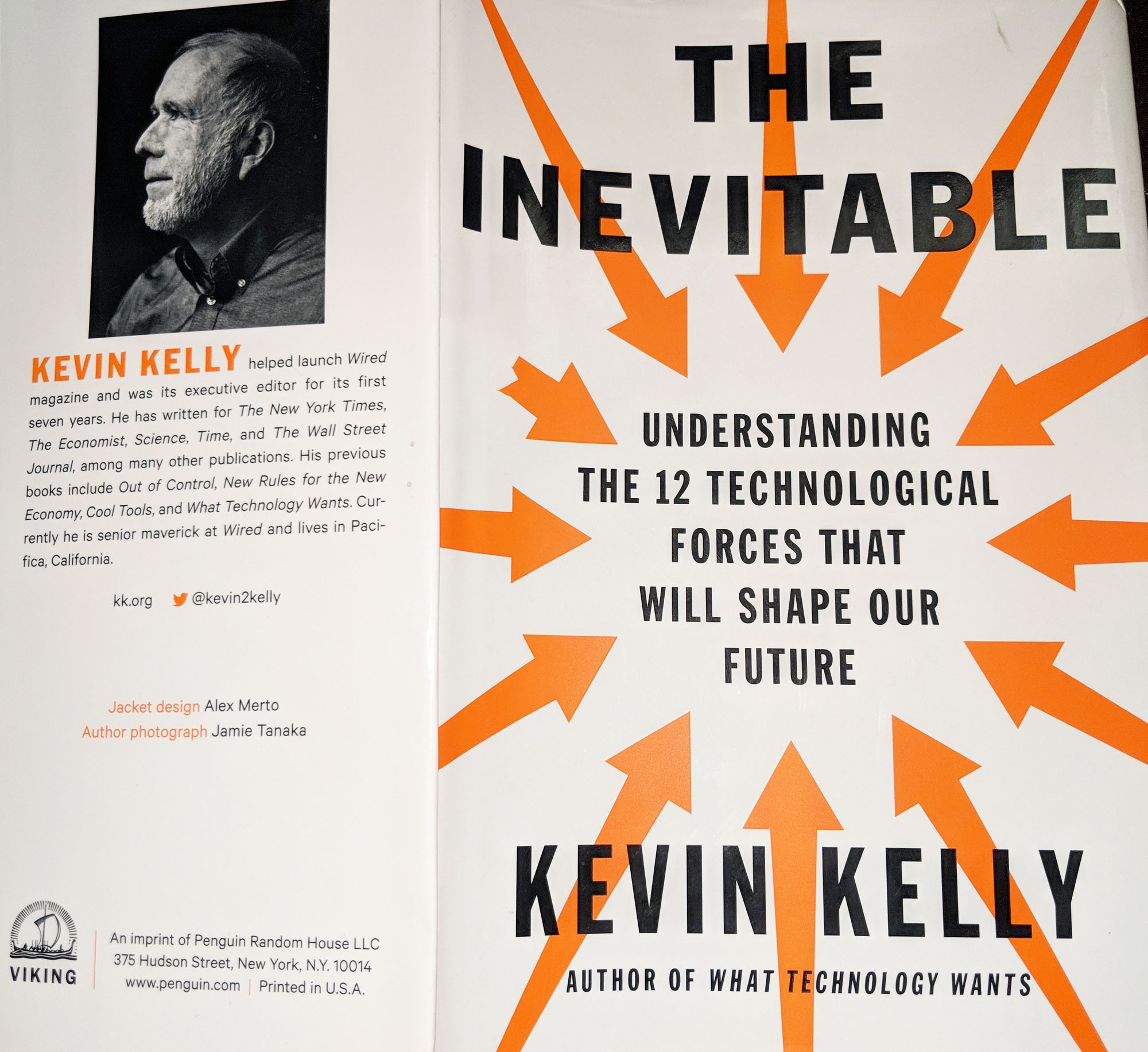I have been referencing this book in many of my talks for more than a year now but getting around to writing this post only now – Venkatarangan
The Inevitable by Kevin Kelly is an insightful book about the technological forces that will/are shaping our future. Kevin Kelly is a well-known thought leader, he was the executive editor of The Wired magazine and has written for most of the marquee magazines including The New York Times, The Economist, Science, Time and the WSJ.
The book starts with the author setting the stage for the discussion to follow: Computer age to have begun in earnest when computers merged with the telephone / network / internet. Our greatest invention in the past 200 years was not a particular gadget or tool but the invention of the scientific process itself.
For Mr Kelly Inevitable are bias(es) in nature of technology that tilts in certain directions and not others. For example, he says we can and should regulate Uber-like services, but we can’t and shouldn’t attempt to prohibit the inevitable decentralization of services. He lists the following 12 technological forces that will inevitably shape our future in the next 30 years:
- Becoming: Because of technology everything is in the process of becoming, All is Flux & Nothing is finished. We are moving away from the world of fixed nouns and toward a world of fluid verbs. Here, I liked his observation “Most inanimate things we know of – stone, iron columns, etc. – won’t last very long without attention and fixing. Existence, it seems, is chiefly maintenance. Keeping a website or a software program afloat is like keeping a yacht afloat. So, I now see upgrading as a type of hygiene.“
- Cognifying: This chapter covers on how Artificial Intelligence accelerates all the other disruptions, and, on the jobs were Robots can do better, on the jobs that only Robots can do and on the jobs that humans only can do, at first. Mr Kelly makes a prophecy that in near-future, everyone will have access to a personal robot.
- Flowing: Think of the internet as a super-conductor, where once a copy is introduced it will continue to flow through the network forever – this is what it means when something goes viral. Mr Kelly argues that fans love to reward their favorite artists, but only under four conditions: Payment should be easy to do, Be reasonable, They should see clear benefit, and, be convinced that it benefits the creators. He talks about the importance of Immediacy, Personalization, Discoverability & Accessibility. Knowledge will rule over atoms.
- Screening: In 2016, there were more than 5 billion digital screens, we are now the People of the Screen. Mr Kelly takes the example of what’s happening with books and reading and puts forth his arguments on what happens when all the books in the world become a single liquid fabric of interconnected words and ideas?. Books were good at developing a contemplative mind. Screening nurtures thinking in real time.
- Accessing: Possession is not as important as it once was. Accessing is more important than ever.
- Sharing: Community sharing can unleash astonishing power. Perhaps a hundred years from now these shared processes, such as Wikipedia, will be layered up with so much management that they’ll resemble the old-school centralized businesses. Even so, the bottom-up was still the best way to start.
- Filtering: There has never been a better time to be a reader, a watcher, a listener, or a participant in human expression. It would consume more than a year’s worth of our attention to merely preview all the new things that have been invented or created in the previous 24 hours. We need a way to triage. We employ all manner of filtering to winnow the bewildering spread of options. More filtering is inevitable because we can’t stop making new things.
- Remixing: Paul Romer, an economist at New York University who specializes in the theory of economic growth, says real sustainable economic growth does not stem from new resources but from existing resources that are rearranged to make them more valuable. All new technologies derive from a combination of existing technologies. They are all remixes. The supreme fungibility of digital bits allows forms to morph easily.
- Interacting: We think technology has saturated our private space, but we will look back in 20 years and realize it was still far away in 2016. In the coming 30 years, anything that is not intensely interactive will be considered broken.
- Tracking: Mr Kelly says that we will track everything that we can and more. Metadata is the new wealth because the value of bits increases when they are linked to other bits.
- Questioning: Every year humans ask the internet 2 trillion questions. We’ve always had questions. Questioning is simply more powerful than answering.
- Beginning: Thousands of years from now, when historians review the past, our ancient time here at the beginning of the third millennium will be seen as an amazing moment.
This book was a fascinating read for me, I have learned a lot of things and it made think on many ideas for months. Thank you Mr Kevin Kelly.



Comments